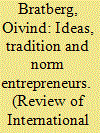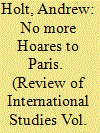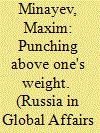| Srl | Item |
| 1 |
ID:
101747


|
|
|
|
|
| Publication |
2011.
|
| Summary/Abstract |
The significance of ideas to foreign policy analysis remains contested, despite a plethora of empirical studies applying ideational frameworks. Drawing on social constructivism, this article proposes a causal understanding where ideas derived from tradition define the political space for contemporary debates and effect foreign policy behaviour. This ideational approach is substantiated by a historical study of guiding principles in British and French foreign policy, which establish a set of baseline expectations for the analysis of Tony Blair and Jacques Chirac's speeches on Iraq. The empirical study shows that whereas Chirac largely stayed within a French ideational framework, Blair applied a more complex combination of ideas from both traditions. Conceptualising Blair as an aspiring (but ultimately unsuccessful) norm entrepreneur is a fruitful interpretation of this role.
|
|
|
|
|
|
|
|
|
|
|
|
|
|
|
|
| 2 |
ID:
105654


|
|
|
|
|
| Publication |
2011.
|
| Summary/Abstract |
Italy's invasion of Abyssinia in October 1935 prompted a major European crisis. This article applies the main theories of foreign policy analysis to the British Government's handling of this crisis. It argues that bureaucratic politics existed, but had little impact on outcomes. Domestic politics had more influence, but did not provide detailed instructions on how to act. The perceptions of key actors, informed by reasoned judgement, determined this. Fears of the threat posed by rival states coalesced with concerns about Britain's own military weakness, leading decision-makers to emphasise the need to act in tandem with France. British policy was therefore motivated by the tension between the public's desire to see action against Italy and the Government's wish to minimise any breach with her allies. These findings highlight the weaknesses of the bureaucratic politics model and show how domestic politics can affect foreign policy outcomes. They also demonstrate the interaction between rational analysis defined in terms of reasoned judgement, and actors' perceptions. It is thus argued that benefits are to be gleaned from combining these theories.
|
|
|
|
|
|
|
|
|
|
|
|
|
|
|
|
| 3 |
ID:
101710


|
|
|
|
|
| Publication |
2010.
|
| Summary/Abstract |
he conservative ideologists have come to the ultimate conclusion that it does not make sense to rely on the European Union as a protector of Britain's national interests in the international scene and that its own independent capabilities should be built up. In the new European context London's approach might become a model to follow for other major EU states.
|
|
|
|
|
|
|
|
|
|
|
|
|
|
|
|